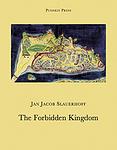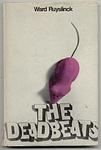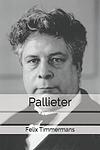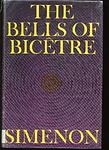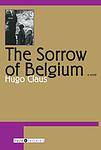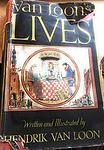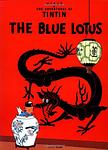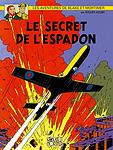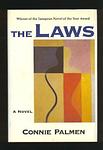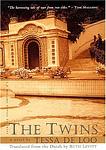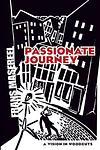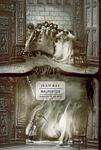The Greatest Dutch, Belgian "Fiction" Books Since 1900
Click to learn how this list is calculated.
This list represents a comprehensive and trusted collection of the greatest books. Developed through a specialized algorithm, it brings together 300 'best of' book lists to form a definitive guide to the world's most acclaimed books. For those interested in how these books are chosen, additional details can be found on the rankings page.
Genres
Countries
Date Range
Reading Statistics
Click the button below to see how many of these books you've read!
Download
If you're interested in downloading this list as a CSV file for use in a spreadsheet application, you can easily do so by clicking the button below. Please note that to ensure a manageable file size and faster download, the CSV will include details for only the first 500 books.
Download-
1. The Discovery of Heaven by Harry Mulisch
"The Discovery of Heaven" is a philosophical novel that explores the relationship between mankind and the divine. The story revolves around two friends, an astronomer and a philologist, who are manipulated by heavenly forces to father a child who is destined to return the Ten Commandments to God. As the narrative unfolds, it delves into complex themes such as friendship, love, art, science, and the existence of God, presenting a thought-provoking analysis of the human condition.
-
2. Cheese by Willem Elsschot
The novel revolves around a Dutchman living in Antwerp, Belgium, who is persuaded by his brother to enter the cheese business. He invests in 10,000 full-cream cheeses and sets up an office, but struggles to sell any of his stock. As he grapples with the nuances of the cheese trade, his personal life and professional relationships also begin to crumble, leading to a series of comical and tragic events. The book is a satirical commentary on business, ambition, and the absurdity of life.
-
3. All Souls' Day by Cees Nooteboom
"All Souls' Day" is a novel about a Dutch documentary filmmaker, who, after losing his wife and daughter in a car accident, moves to Berlin to escape his grief. The protagonist becomes entangled in a series of romantic relationships while struggling to come to terms with his loss. The book blends narrative with philosophical musings on memory, loss, and the nature of time, using the city of Berlin as a backdrop to illustrate the protagonist's internal journey.
-
4. The Forbidden Kingdom by Jan Jacob Slauerhoff
"The Forbidden Kingdom" is a historical fiction novel that intertwines the stories of two men, a 20th century sailor and 16th century Portuguese poet, Luis Camões. The narrative alternates between the two, exploring the sailor's obsession with the poet's life and the poet's experiences in the East, including his journey to Macao. The book delves into themes of identity, obsession, and the clash of Eastern and Western cultures.
-
5. The deadbeats: a novel by Ward Ruyslinck
"The Deadbeats" is a gripping novel that follows the story of a man who, after losing his wife and job, descends into alcoholism and homelessness. The narrative delves into the harsh realities of life on the streets, exploring themes of despair, survival, and the human capacity for resilience. Despite the protagonist's struggles, the book also highlights moments of compassion and camaraderie among society's outcasts.
-
6. Forever a Stranger by Hella S. Haasse
"Forever a Stranger" is a historical novel set in the 19th-century Dutch East Indies, now known as Indonesia. It tells the story of Rudolf, a half-Dutch, half-Javanese boy, who is raised by his Dutch father after his Javanese mother's death. Throughout his life, Rudolf grapples with his mixed heritage and struggles to find a sense of belonging, experiencing the harsh realities of colonialism and the cultural divide between the Dutch and the Javanese. The narrative provides a critical examination of colonialism and its impact on identity, culture, and society.
-
7. Pallieter by Felix Timmermans
"Pallieter" is a classic Flemish novel that depicts the life of a jovial and life-loving man, Pallieter, who lives in harmony with nature in a small Belgian town. The story showcases his love for the simple pleasures of life, his interactions with the townsfolk, and his deep connection with the natural world. However, when industrialization threatens his idyllic lifestyle, Pallieter decides to leave his beloved town. The novel is a celebration of life and nature, while also exploring the impact of industrialization on rural life.
-
8. Return to Oegstgeest by Jan Wolkers
"Return to Oegstgeest" is a semi-autobiographical narrative that explores the author's childhood and adolescence in the small Dutch town of Oegstgeest during the pre and post-World War II era. The book delves into the author's troubled relationship with his stern, religious parents, his struggles with faith, and his burgeoning artistic and sexual awakening. The narrative is a poignant exploration of memory, family, and the experiences that shape one's identity.
-
9. The Garden Where the Brass Band Played by Simon Vestdijk
This novel explores the life of a young boy named Nol Rieske, who falls in love with the daughter of a bandmaster in a small Dutch town. As he grows older, he becomes a successful musician, but his obsession with the bandmaster's daughter, who is mentally ill, continues to dominate his life. The story is a detailed exploration of a man's lifelong infatuation and its profound impact on his personal and professional life.
-
10. The bells of Bicêtre by Georges Simenon
The novel chronicles the life of a successful newspaper publisher who suffers a stroke and finds himself confined to a hospital bed, unable to communicate with the world around him. As he lies in his hospital bed, he is forced to reassess his life, his relationships and his own identity. The book explores themes of mortality, the meaning of life, and the complex nature of human relationships.
-
11. Old People And The Things That Pass by Louis Couperus
This novel delves into the hidden secrets and unspoken truths of an elderly couple, revealing the profound impact of their concealed affair on their family across generations. As the narrative unfolds, it exposes the complexities of human relationships and the consequences of past actions, illustrating how secrets can ripple through time, affecting not just those who keep them but also their descendants. The story masterfully explores themes of guilt, redemption, and the inescapable nature of the past, all while painting a poignant picture of aging and the inevitable passage of time.
-
12. Rituals by Cees Nooteboom
"Rituals" is a philosophical novel that explores the lives of three men, each dealing with existential crises in post-World War II Netherlands. The narrative delves into their individual searches for meaning and purpose, their struggles with societal norms, and their attempts to establish personal rituals as a way to create order in a seemingly chaotic world. The book is a profound meditation on the human condition, examining themes of time, death, and the nature of reality.
-
13. Smell of Sadness by Alfred Kossmann
"Smell of Sadness" is a poignant narrative that revolves around a man who, after being separated from his wife during the Second World War, embarks on a journey to find her. The story takes us through the protagonist's experiences, his encounters with various people, and his personal struggles. The book is a deep exploration of human emotions, particularly the profound sadness that permeates through the protagonist's life, making it a moving and thought-provoking read.
-
14. The Sorrow of Belgium by Hugo Claus
"The Sorrow of Belgium" is a coming-of-age story set against the backdrop of World War II. The narrative follows the life of a young boy in a Flemish town, as he navigates through the complexities of adolescence, family relationships, and the harsh realities of war. The novel provides an insightful exploration of Belgian history, culture, and the nation's struggle under the Nazi occupation, all through the eyes of the protagonist.
-
15. Van Loon's Lives by Hendrik Willem van Loon
The book in question is a unique blend of biography, autobiography, and fantasy, where the author imagines inviting historical figures from different eras to dinner at his home. Through a series of lively conversations and interactions, the author and his guests explore the lives and thoughts of these famous individuals, ranging from philosophers and scientists to artists and rulers. The narrative provides a creative and insightful look at history, as well as the author's own musings on life, culture, and human progress, all while blurring the lines between past and present in an engaging and whimsical manner.
-
16. Gimmick! by Joost Zwagerman
"Gimmick!" is a novel that explores the life of a young artist in the Amsterdam art scene during the 1980s. The protagonist is caught in a world of excess, parties, drugs, sex, and betrayal while trying to find his place and make a name for himself. The story delves into the struggles of artistic life, the lure of fame and the pitfalls of success, providing a raw and gritty depiction of the times.
-
17. The Blue Lotus by Hergé
In "The Blue Lotus," a young reporter is sent on a mission to Shanghai during the Sino-Japanese War, where he uncovers a dangerous opium trafficking operation. Along the way, he befriends a Chinese boy who helps him navigate the cultural and political complexities of the region. The story combines elements of adventure, mystery, and political intrigue, set against the backdrop of historical events.
-
18. The Strange Case of Peter the Lett by Georges Simenon
This classic crime novel centers around a man named Peter the Lett, who is suspected of committing a series of murders in Paris. He is a foreigner, a loner, and has a mysterious past, which makes him the perfect suspect for the crimes. However, as the investigation unfolds, it becomes clear that the truth is far more complex. The narrative delves into themes of identity, prejudice, and the nature of guilt and innocence, offering a psychological portrait of a man caught in a web of circumstances beyond his control.
-
19. Blake and Mortimer by Edgar P. Jacobs
"Blake and Mortimer" is a comic series centering on two British heroes, a military intelligence officer and a nuclear physicist. The pair often find themselves embroiled in various international intrigues, battling against super-powered villains, alien invaders, and ancient civilizations. The series is known for its detailed artwork and complex plots, often involving science fiction and paranormal themes.
-
20. The Laws by Connie Palmen
"The Laws" is a philosophical novel that follows the life of a young woman studying philosophy who becomes intrigued by the concept of laws, both societal and personal. Over the course of seven years, she engages in relationships with seven different men, each representing a different aspect of her studies including a priest, a physicist, an artist, a psychiatrist, a lawyer, a biologist, and a writer. Each relationship provides a new perspective on her quest to understand the laws of the universe and human nature.
-
21. The Twins by Tessa De Loo
"The Twins" is a poignant narrative about twin sisters, separated at a young age due to the Second World War. One sister grows up in the Netherlands under Nazi occupation, while the other is raised in Germany as part of the Hitler Youth. After six decades of separation, they meet again and begin to share their experiences, discovering the impact of the war on their lives and the stark differences in their upbringing. The book explores themes of identity, loyalty, and the long-lasting effects of war on individuals and families.
-
22. Margot and the Angels by Kristien Hemmerechts
"Margot and the Angels" is a poignant story about a woman who, after losing her husband and children in a car accident, is left to navigate life on her own. As she grapples with her grief, she finds solace in the company of three angels who appear to her. The angels help her make sense of her tragedy, guiding her towards acceptance and healing. The book explores themes of loss, grief, resilience, and the power of faith, offering a compelling exploration of the human capacity to endure and find hope amidst despair.
-
23. Passionate Journey by Frans Masereel
"Passionate Journey" is a silent graphic novel that tells the story of a man's life and experiences through a series of woodcuts. Without the use of words, the book conveys a powerful narrative that explores the human condition, society, and the range of emotions that one encounters throughout life. The protagonist's journey is depicted in a sequence of compelling images that reflect on themes such as love, struggle, joy, and the search for meaning. The novel's visual storytelling invites readers to interpret and imbue the images with their own understanding, making it a unique and personal experience for each individual who engages with it.
-
24. Red Lights by Georges Simenon
"Red Lights" is a psychological thriller that delves into the unraveling of an American couple's marriage against the backdrop of a road trip from New York to Maine. As they set out to pick up their children from camp, the husband's penchant for alcohol and the couple's underlying tensions escalate. After a series of bar stops and a fateful decision to pick up an escaped convict, the journey spirals into a nightmarish ordeal. The narrative explores themes of existential dread, personal responsibility, and the search for redemption, as the characters confront their inner demons and the consequences of their choices under the strain of extraordinary circumstances.
-
25. Malpertuis by Jean Ray
"Malpertuis" is a gothic novel that weaves together the surreal and the macabre, telling the story of a mysterious and ancient house in Belgium that is as much a character as the people inhabiting it. The narrative unfolds through the eyes of a young man who becomes entangled in the enigmatic and often disturbing events within the walls of Malpertuis. As the story progresses, it becomes clear that the house is a labyrinthine trap for a pantheon of gods who have dwindled in power and are now imprisoned in mortal forms by the dying will of an old and cunning man. The novel blends mythology, horror, and philosophy, creating an unsettling and dreamlike atmosphere that questions the nature of reality and the gods' place in the modern world.
Reading Statistics
Click the button below to see how many of these books you've read!
Download
If you're interested in downloading this list as a CSV file for use in a spreadsheet application, you can easily do so by clicking the button below. Please note that to ensure a manageable file size and faster download, the CSV will include details for only the first 500 books.
Download


